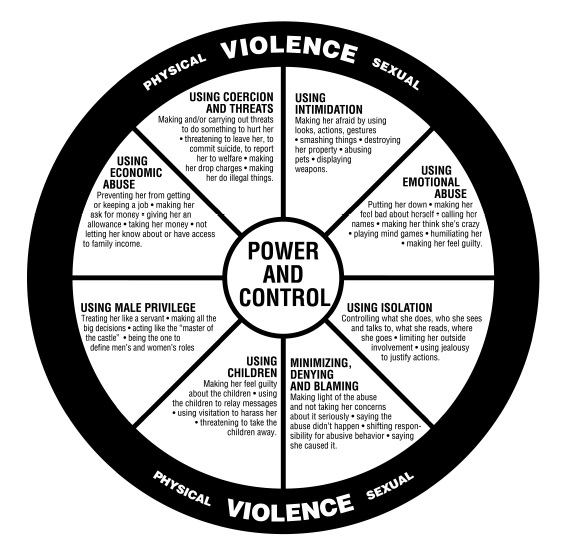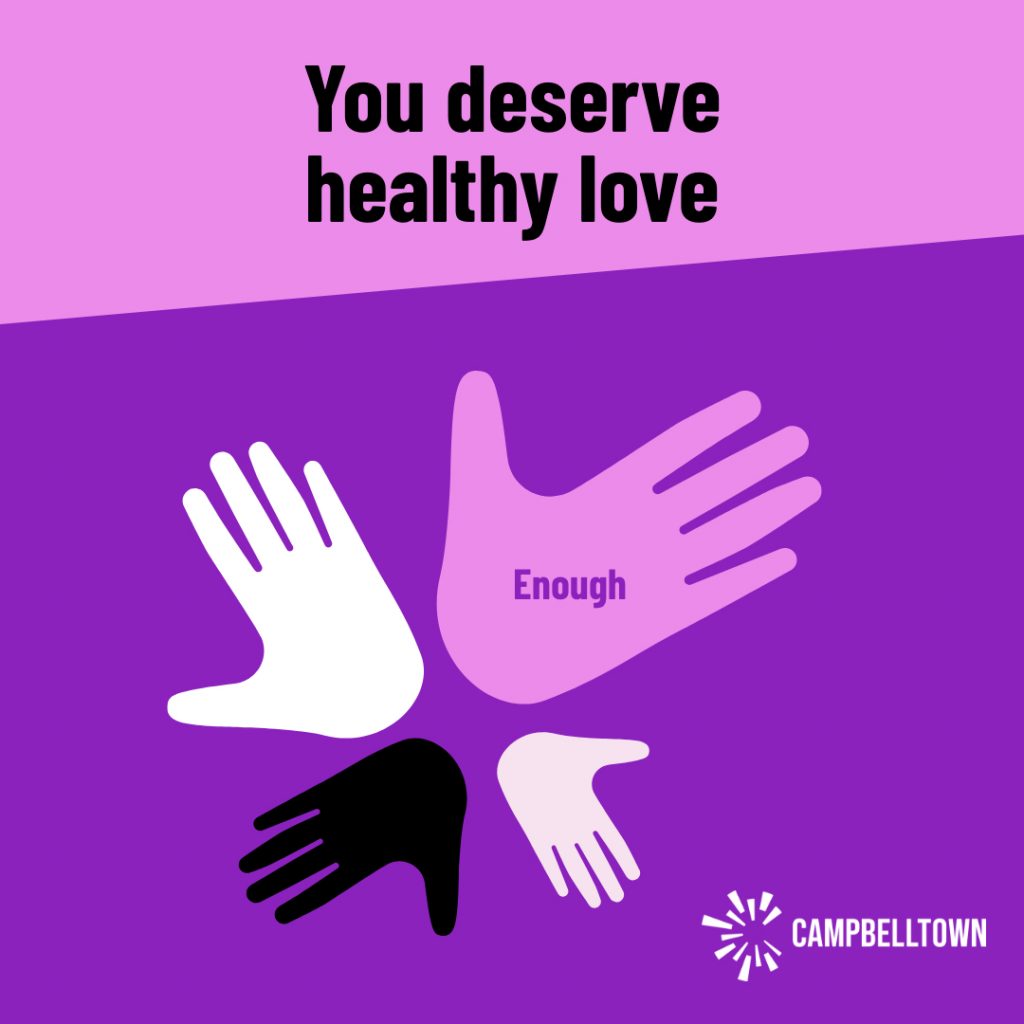DOMESTIC VIOLENCE FACTS
Someone respects you when they accept that you have a right to do and say what you want.
In a Healthy Relationship you feel respected and safe. A Healthy relationship communication is open, honest, respectful and you can freely express your opinion and feelings. You do not feel scared or fear retaliation.
An unhealthy relationship is characterised by an ongoing pattern of behaviour, such as lack of communication, power imbalances, lack of mutual respect, physical and other forms of abuse.
Are You Safe?
To determine if your relationship is abusive you need to look at what the other person is doing, how it affects your life, how it makes you feel and where the balance of power lies in the relationship. Trust your intuition – if something does not feel right to you then it is not ok.
Does your former or current partner, boyfriend or girlfriend, flatmate, carer, or family member:
- Make you feel uncomfortable or afraid?
- Often puts you down, humiliates you, or makes you feel worthless?
- Constantly checks up on what you are doing or where you are going?
- Tries to stop you from seeing your own friends or family?
- Makes you feel afraid to disagree or say ‘no’ to them?
- Constantly accuses you of flirting with others when this isn’t true?
- Tells you how the household finances should be spent, or stops you having any money for yourself?
- Stops you from receiving medical help?
- Scares or hurts you by being violent (for example, hitting, choking, smashing things, locking you in, driving dangerously to frighten you)?
- Pressures or forces you to do sexual things that you don’t want to do?
- Threatens to hurt you, or to kill themselves, if you say you want to end the relationship?
- Interferes with your online access or access to the phone?
- Hurts your children or performs violent actions in front of your children?
Does your former or current partner, boyfriend or girlfriend, flatmate, carer, or family member make you feel:
- fearful or scared?
- anxious?
- sick?
- numb?
- like you have no confidence?
- so stressed that you have trouble sleeping because of these feelings?
- physical symptoms, such as tense muscles or a racing heart beat because of these feelings?
- unable to concentrate because of these feelings?
If you have answered ‘yes’ to any of these, then you could be experiencing abuse. If you don’t feel safe, respected and cared for, then something isn’t right.
(courtesy of DCJ) How to recognise domestic and family violence | Family & Community Services (nsw.gov.au)
Violence against women and children is not acceptable for any reason. You are not responsible for any form of abuse and are not alone with the pain and suffering you are experiencing. If you answered Yes to the questions, refer to our Getting Help page; if you are in immediate danger dial Triple 000.
Domestic Violence Definition
Violence against women is any act of gender-based violence that causes or could cause physical, sexual or psychological harm or suffering to women, including threats of harm or coercion, in public or in private life.
— UN Declaration
Violence against women (VAW) can be referred to as domestic violence/abuse, family violence, intimate partner violence, coercive control, harassment, and sexual assault. Domestic violence is violence that occurs between current or former intimate partners. Violence against women may be from someone they know or strangers, e.g. stalking.
Causes of Domestic Violence
Gender inequality is the underlying driver of domestic violence.
DOMESTIC VIOLENCE IS MORE THAN PHYSICAL
Fear can be the most powerful means of control. Fear can be created through any behaviour which is used to intimidate you and which takes away your power.
Intimidation includes breaking your possessions, intimidating body language, hostile and aggressive questioning, constant calls, emails, text messages and stalking.
Physical abuse includes physical harm to you, your children, your property, family, friends and pets. It may also involve the threat of weapons. Includes, hitting, punching, kicking, choking, and strangulation.
Sexual Abuse includes any forced or unwarranted sexual interaction. This may include: forced sexual acts, harassment, or sexual harm.
Verbal abuse includes constant put-downs, insults and verbal threats. Verbal abuse is a humiliating experience and over time can destroy your self-esteem and self-belief.
Emotional/psychological abuse includes behaviour/actions and comments to undermine your sense of self and destroy your self confidence/worth. Gaslighting, trying to make you belief you are crazy.
Coercive control controlling and monitoring movements, controlling all aspects of your life; finances, who you talk to
Spiritual abuse includes ridiculing your spiritual beliefs and/or excluding you from taking part in cultural or spiritual activities.
Financial abuse occurs when the abuser takes control over your financial resources. This may include not allowing you to work or making the decisions about the money you earn or spend.
Social Abuse is when the abuser criticises, jokes about or puts you down in front of family, friends, work friends, etc and/or controls where you go and who you see. These are attempts to isolate you from family and friends.
Stalking – can be physically stalked, watched, turns up at your home or workplace uninvited, maybe monitoring movement or stalking online.
Cyber bullying/cyber harassment includes use of email, instant messaging, chat rooms, mobile phones or other forms of information and digital technology (including social media) to harass, humiliate or intimidate.
Who is At Risk of Violence
Family, domestic and sexual violence occurs across all ages and demographics.
Children
Children are most vulnerable to family, domestic and sexual violence.
Women
More women than men experience family, domestic and sexual violence.
Effects of DFV
For adults and children DFV causes physical, emotional and mental stress and health issues, such as
- sleeping problems
- self harm
- depression
- nausea, headaches
- on edge, tearful
Cycle of Abuse
Domestic Violence is a power imbalance, one person dominates over another and uses violence to control. The Duluth Wheel explains the use of Power and Control tactics. Aburesers use tactics to control and this can be seen in certain behaviours that can be a Red Flag –
- Charming, over attentive at the start of a relationship
- Extreme jealousy, fly off the handle, tell you what wear, how to dress
- You become isolated, not allowed to see friends, family, can’t go out with others without being tracked, questioned
- When they do “lose control” you are blamed and then they get remorseful and promise it won’t happen again – but it does

There is always the hope that the situation will improve and this keeps us locked into the abusive situation with our dreams of a happy and harmonious family life. To hold on to this hope and dream we will keep the peace at all cost. This is where we start walking on egg shells waiting for the next cycle of abusive behaviour. Our hope is sustained by the promises by the abuser and the disappointments when the behaviour re-appears.
WHY IS LEAVING SO HARD
Trauma bonding is the attachment an abused person feels for their abuser, specifically in a relationship with a cyclical pattern of abuse. There are good times, and the abuser says sorry. This makes it hard to leave, the belief this is love, wanting the relationship but the abuse to stop.
Victims can be scared to leave, high risk of increased violence when attempting to leave, don’t know where to go or get help.
There is support available and workers to help you leave and be safe. Refer to Getting to Help page or call DV Hotline on 1800 65 64 63.
In an emergency always dial Triple 000.
FURTHER INFORMATION ON DFV:
Information in Community Languages – Domestic violence: Factsheets | Family & Community Services (nsw.gov.au)

